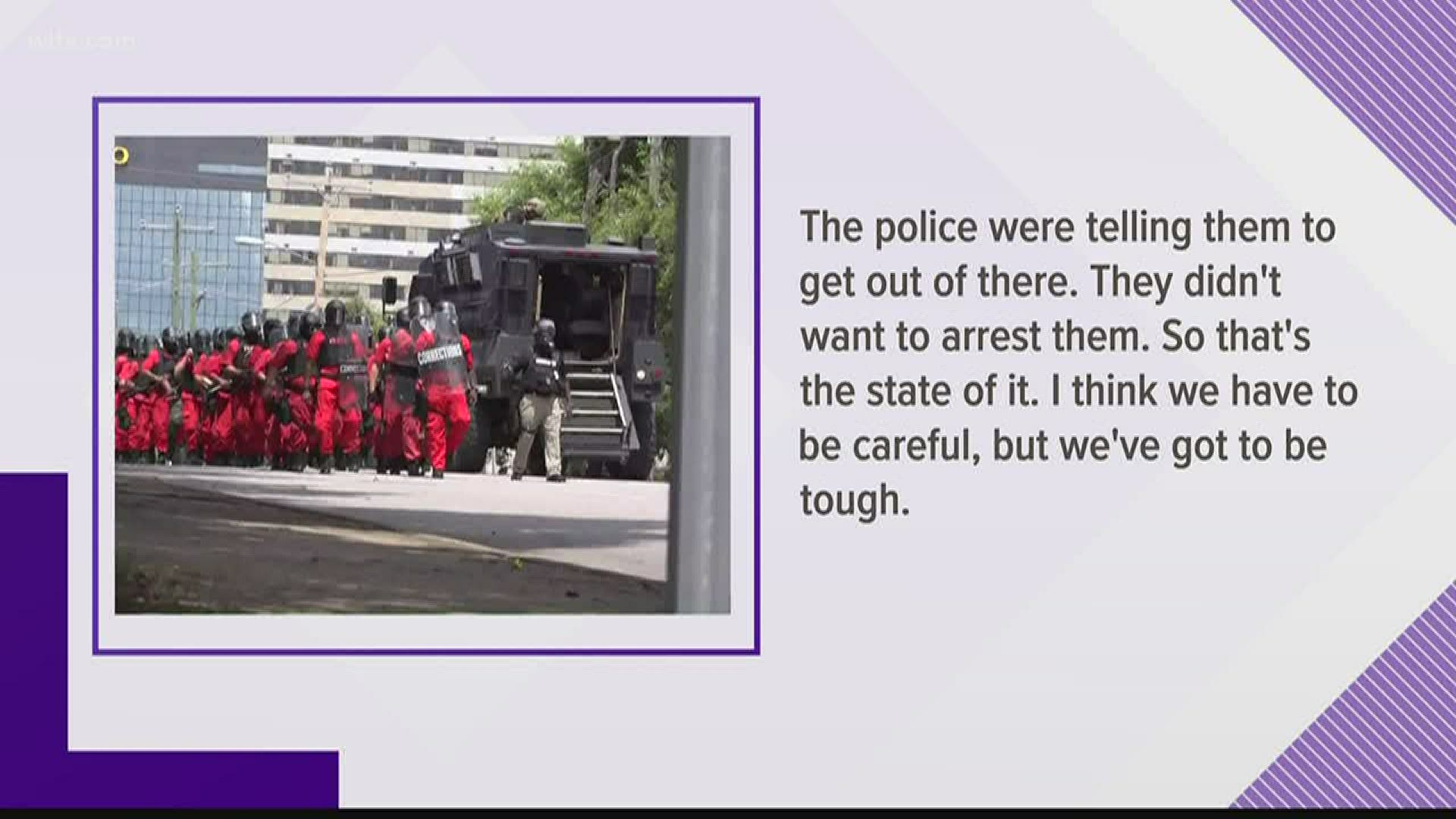COLUMBIA, S.C. — President Donald Trump and South Carolina discussed tactics used to stop protests during a call with governors.
The exchange happened Monday, in a widely reported on call where Trump called some governors "weak" for their response so far to protests. He also called for strong penalties for people arrested for violence at the demonstrations.
At one point, the President addressed McMaster. Below is that exchange.
Donald Trump:
Thank you very much, governor. Thank you. It was great to have you at the White House last week too. Henry McMaster. I think I hear Henry McMaster on the line. He's talking to his people, which I think is much more important than talking to us, Henry, because I know what you're doing. You're getting them ready. You're getting them ready. Yes, sir, go ahead.
Governor McMaster:
Thank you, Mr. President. I plugged in to what you were saying, and also what the attorney general was saying. It seems listening to the governors in telephone calls, those were the days. And also what we've been saying today is I don't think we're prosecuting enough people. It seems-
Donald Trump:
I agree.
Governor McMaster:
… these folks, they're just getting a 30 days or $500. That's just the cost of doing business. We know that we have organized people. We're trying to figure out if we've got some here. We think maybe we do, but we have a state grand jury that's just like the federal grand. They tend to act as they can and bring them before that grand jury where we can investigate using the tools of the grand jury. We talked to our US Attorney, Peter McCoy, but everybody was on board and we really had a model thing happen in the city of Charleston.
The first night, they had one approach with a late 11 o'clock curfew. They had a whole lot of violence. They were taking, I guess you'd say a less confrontational approach and they had a lot of damage on King Street, beautiful place. People were busting out windows in restaurants, throwing in big firecrackers landing on the tables of diners and that because there was no curfew. The diners were still there and it was scaring everybody. They were running out. We had one fella who pulled out a pistol, a civilian in the hotel, fired off shots in the air to scare of some of the agitators, they are, a lot of them are from outside. There's no doubt about it. They're calling this Antifa, or whatever you call it.
We had arrested one man in Columbia, and he had a Glock pistol in a knapsack and 90 rounds of ammunition. Of course, we've got him locked up now and hope to be able to get some information from him. But I think what you're saying is right, is we have to make it more difficult. We've got to take these people out, give them justice, make it more than just the cost of doing business to come into one town, get arrested, pay bonds, and go to another town and do the same thing.
We had law enforcement everywhere from Department of Corrections, Probation, Pardon, the State Law Enforcement Division, the city police. We had county Sheriffs coming in from adjoining counties. And in Charleston, we had the National Guard there on Sunday night, last night, and they had virtually no problems. The national guard, the sheriff there, Al Cannon says he's never seen such a police presence in his life. And it worked like a charm. I think it was just a handful of arrests. There was no damage. They had five Humvees rolling around the city of Charleston. It was very peaceful. So, strength works. You have to dominate, as you said. And I think now is really the time to get serious about prosecuting these people, finding out where their organizations are, who's paying the money. We knew that some of them get a bonus if they get arrested. They were putting out their hands to get arrested. They wanted to. The police were telling them to get out of there. They didn't want to arrest them. So that's the state of it. I think we have to be careful, but we've got to be tough.
Donald Trump:
You don't have to be. And I'll tell you, you have to do the prosecutions. If you don't do the prosecutions, it's just going to be back. Whether it's in two years or two months, they're going to be back and you've got to do the prosecutions. When somebody's throwing a rock, that's like shooting a gun. What's the difference between having a brick that weighs 10 pounds hit somebody in the face and wipe them out practically. We had a couple of people badly hurt and there's no retribution. So you have to do retribution, in my opinion. You have to use your own legal system maybe for that. But you have great legal systems. Everybody I'm speaking to. But if you want this to stop, you have to do that. But you have to prosecute people, Henry, you're right. Thank you very much.
Governor McMaster:
Thank you.

